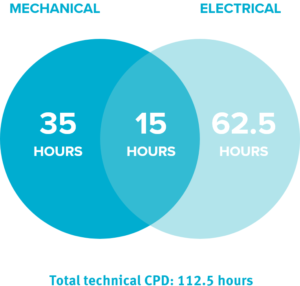28 Jan Revised Continuing Registration Requirements Policy
BPEQ has developed a revised Continuing Registration Requirements (CRR) Policy for engineers applying for renewal or restoration of their registration.
CRR are requirements that, if satisfied, demonstrate that an applicant for renewal or restoration of registration has maintained competency in their area/s of engineering and within their area of competence for which the applicant is, or was, registered.
The policy sets out:
- the framework on the nature and extent of continuing professional development (CPD) to be undertaken by the applicant;
- the framework on the nature and extent of research, study or teaching, relating to engineering, to be undertaken by the applicant; and
- the framework on the nature and extent of administrative work, relating to engineering, to be performed by the applicant.
RPEQs registered with an assessment entity for participation in CPD
If the applicant is registered with an approved assessment entity for participation in the CPD of the entity, the applicant is to comply with the requirements of that entity.
Assessment entities can provide notifications to the Board on applicants who fail to meet the CPD requirements of that assessment scheme and would therefore not comply with BPEQ’s CRR Policy.
RPEQs complying with the BPEQ’s CRR Policy
If the applicant is not registered with an approved assessment entity for participation in the CPD of an assessment scheme, the applicant must comply with the Board’s CPD scheme for the area of engineering for which the applicant is, or was registered.
The Board’s CPD requirements are, that to continue to be eligible for registration, applicants must:
- complete a minimum of 150 hours of CPD over a three-year period leading up to the renewal or restoration of their registration in the area/s of engineering for which the applicant is, or was, registered;
- undertake a minimum 75% (112.5 hours) of the 150 hours as technical CPD;
- undertake a maximum of 25% (37.5 hours) of the 150 hours as non-technical CPD (e.g. project management, law, communication);
- undertake as a minimum, 1 hour of non-technical CPD covering ethics; and
- undertake as a minimum, 1 hour of non-technical CPD covering risk management.
CPD for multiple areas of practice
If you are registered for more than one area of engineering, you must record as a minimum at least 50 hours of technical CPD for each area of engineering. You must also continue to meet the minimum requirement of 112.5 hours overall of technical CPD.
For example, if you are registered for mechanical and electrical engineering, you must undertake a minimum of 50 hours of technical CPD related to both mechanical and electrical. Some technical CPD activities may overlap and in this case, you can label the activities as both mechanical-related and electrical-related CPD.
The diagram below illustrates a situation where 15 hours of technical CPD is related to both mechanical and electrical. The RPEQ in this example complies with the minimum requirement of 112.5 hours of technical CPD, and the minimum requirement of 50 hours per area of engineering.

Part-time or casual employment provision
BPEQ’s CRR Policy is more flexible for RPEQs who are working in a part-time or casual capacity.
For the purpose of this provision, full-time employment is defined as usually working 37.5 hours per week or more. Part-time/casual employment is defined as usually working less than 30 hours per week in all jobs.
While the Board has the discretion to review CPD compliance on a case-by-case basis, RPEQs who fall within the definition of part-time or casual employment may be eligible to complete reduced CPD hours over three years.
The Board’s requirements are, that to continue to be eligible for registration, RPEQs who are considered to be part-time or casual may:
- complete as a minimum, 112.5 hours of technical CPD over a three-year period leading up to the renewal or restoration of their registration in the area/s of engineering for which the applicant is, or was, registered;
- undertaking additional non-technical CPD is encouraged but will not count toward the required 112.5 hours that is required;
- undertake as a minimum, 1 hour of non-technical CPD covering ethics; and
- undertake as a minimum, 1 hour of non-technical CPD covering risk management.
Career break provision
BPEQ’s CRR Policy is more flexible for RPEQs who have been on a career break of at least six months during the three year period. RPEQs who fall within the career break provision, may be eligible to complete 150 hours of CPD over five years rather than the standard three years.
A RPEQ is regarded to have had a career break if they have a period of leave from the workforce of at least six continuous months, but less than five years for any proper cause, such as:
- a serious illness
- parental leave
- extended travel
- caring for family members
- involuntary unemployment
The career break provision does also apply to RPEQs registered as non-practising.
CPD types and limitations
BPEQ’s CRR Policy applies limits to certain types of CPD activities:
| TYPE | DESCRIPTION | LIMITATIONS |
|---|---|---|
| 1 | Formal post-graduate study or tertiary course units not undertaken for award purposes. | There is no limit to the maximum numbers of hours you can claim. |
| 2 | Short courses, workshops, seminars and discussion groups, conferences, technical inspections and technical meetings. | There is no limit to the maximum number of hours you can claim. |
| 3 | Structured learning activities in the workplace that extend competence in the area/s of engineering. | A maximum of 75 hours of you total CPD may be claimed. |
| 4 | Private study which extends knowledge and skills. | A maximum of 18 hours of your total CPD may be claimed. |
| 5 | Service to the engineering profession. | A maximum of 50 hours of your total CPD may be claimed. |
| 6 | Preparation and presentation of papers for courses, conferences | A maximum of 45 hours for papers published in journals and conference proceedings, or a maximum of 75 hours for papers subject to critical peer review. |
| 7 | Practitioners employed in tertiary teaching or academic research. | A minimum of 40 hours of industry involvement must be claimed. |
*RPEQs employed in a part-time or casual capacity and complying with the part-time or casual provision are not able to claim CPD hours for private study toward their required 112.5 hours.
To view the policy in full visit Continuing Registration Requirements Policy

 MY ACCOUNT
MY ACCOUNT
